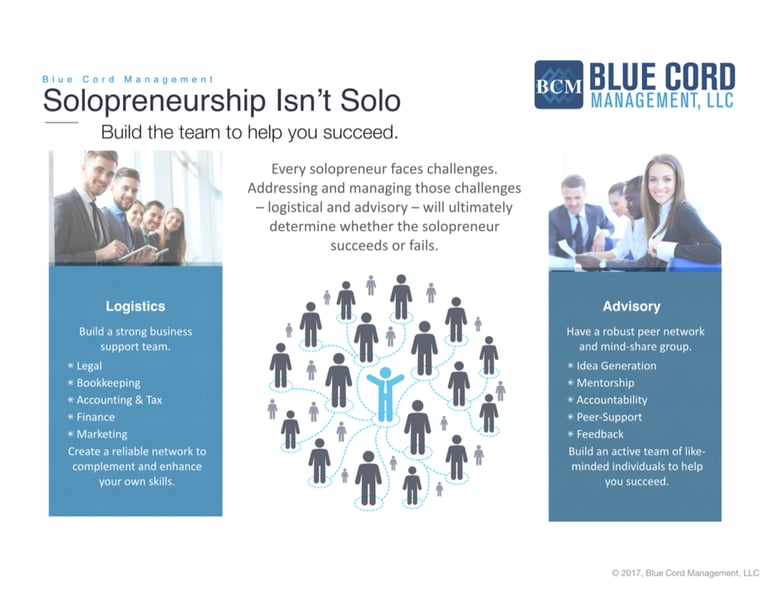Solopreneurship Isn't Solo: How to Get the Help You Will Need to Succeed

If you aren’t one yourself, you probably know one: a solopreneur.
Solopreneurship (running a business alone without co-entrepreneurs or employees) has become a new business model that more and more people are exploring. A solopreneur starts the business, owns the business, runs the business and is responsible for its success or failure.
Solopreneurship has many appeals, including the freedom from hierarchical chains of command and red tape, the ability to make decisions quickly, be accountable only to oneself, earn financial rewards, and experience a sense of achievement. Solopreneurs pursue an individual ‘vision’ and build a business around it.
Solopreneurs are creators and innovators. They don’t start a company to hire employees and they don't have access to piles of money. Essentially, they're creating a niche for themselves in the marketplace.
The number of solopreneurs grows daily – and so does the urgency for each one of them to build great teams to support their efforts. In a way, ‘solopreneur’ is a misnomer; becoming a successful one is not a ‘solo’ undertaking.
Every solopreneur faces challenges. Addressing and managing those challenges – logistical and advisory – will ultimately determine whether the solopreneur succeeds or fails.
Logistically, as a solopreneurial organization grows, it will need to develop proficiencies in areas such as marketing, finance and legal. Absent those proficiencies, the organization will not succeed.
For example, when a solopreneur introduces a new product or service, they’ll need marketing assistance to promote sales, financial help in tracking sales and associated tax issues, and legal advice on obtaining patents or trademarks.
If solopreneurs try to do everything on their own, particularly when they don’t have the expertise in a certain field, they are just asking for trouble. Hiring start-up or other consultants to facilitate the way can be extremely beneficial – as well as provide peace of mind for the solopreneur.
Logistically, other tasks become crucial in freeing up the solopreneur to pursue longer-term strategic goals. For most solopreneurs, these areas include assistance with scheduling, outreach, research and marketing. Building these capabilities will require some investment, but in doing so, the solopreneur can focus on implementing strategy and achieving objectives.
In addition to logistical support, successful solopreneurs make sure to establish and nurture an active “mind share group.” This team is a crucial group of advisors that provides not only advice but also mentorship. A seasoned group of colleagues from a variety of verticals can empower the solopreneur to consider and explore different ideas shared by people who have ‘been there, done that’.
Mind-share groups offer many benefits to the solopreneur. They provide the solopreneur the opportunity to interact with peers in a non-sales environment (i.e. no sales, referrals, or other similar expectations) and discuss challenges and receive input on how to deal with them.

Let’s face it: the solopreneur has selected a business model that does not include business partners or a board of directors to help make business decisions, to brainstorm ideas with and discover strategy weaknesses.
Often missing in solopreneurial enterprises is accountability. When someone is only accountable to themselves, it is easy to procrastinate, defer decision making, or focus on tasks that may not be essential at that time.
The mind-share group described above can provide invaluable guidance for the solopreneur on matters of financial, regulatory, and legal matters. It also provides on-going moral support as the solopreneur addresses day-to-day business challenges.
Planning for and dealing with logistical and advisory challenges in a proactive manner frees up more of the time for the solopreneur to prioritize the work that matters most, and then delegate separate, but critical, tasks that contribute to building a lasting, competitive, and compelling small business.
Ultimately, successful solopreneurs must have deep and objective self-knowledge. They leverage their individual capabilities and skill sets, but seek help from others to mentor on the ‘things’ they lack or just need help handling. It’s a business reality, after all: no one person can do everything successfully.
Contact Blue Cord Management today to schedule a no-charge, no-obligation consultation to meet and talk about your company’s challenges and BCM’s services and solutions. Thinking about how to succeed is important. Doing something to achieve it is essential.


